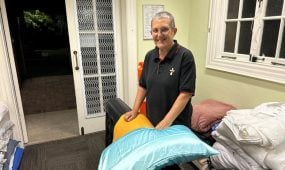Addressing Church stereotypes, silence, blaming and lack of recognition
Justice & Advocacy
“Jan’s grief around her marriage ‘being broken’ and her beliefs that she had ‘betrayed’ her marriage vows and ‘broken her promises’ to God were profoundly influential in her initial inability to accept the priest’s help offered to her. These beliefs were grounded in what some parts of the Church espoused regarding the role of the Church, the Bible, the ‘sanctity of marriage’ and family,” says The Ven. Dr Lucy Morris, Chair of the ACSQ’s Domestic and Family Violence Working Group

Please be aware that this reflection may be distressing for some readers.
“Sometimes it’s really hard to say the words and accept the reality that domestic and family violence is really happening in a relationship. Sometimes, the awareness comes out of the blue, the ‘knowingness’ about what is happening. Sometimes, what someone has lived with all their life is so normal, it’s hard to get that it’s actually unacceptable.” These are the words from a survivor of domestic and family violence, who never saw herself as a victim, nor as someone who was a survivor.
Advertisement
*Jan was a bit older than her husband. They had two children and they’d moved interstate three times to try fresh starts. Her husband had experienced a bad accident and his behaviour consequently worsened. He hadn’t been well since. He’d always made complaints that she was not good enough, and she was constantly reminded she was never good enough, but it became worse. He told her that she was a useless mother, wife and home-maker, and that she was letting the family down by working as a cleaner. His income stopped when he wasn’t well enough to keep working and she became the sole income earner. He enquired about what she was doing all the time going to church, about whom she was she talking to and what about. Their friends drifted away because it was always so uncomfortable with him; he was either over friendly, over patronising or over critical. The children started home schooling. People were concerned because they never answered the phone and their home became unkempt and chaotic.
Jan finally disclosed her unhappiness to her parish priest, while (at that stage) unable to accept there was any domestic and family violence, saying her husband was mentally ill, and nothing else. The Department of Child Safety became involved, and the children were taken into care. Jan’s fear of her husband’s violence became more pronounced and a “protection order” was given by the court. She made him leave home and tried to keep herself safe. But the terms of the protection order were not kept by the husband, with Jan also remaining in contact with him. His counselling fell over because he refused mental health treatment believing there was nothing wrong with him and that he was being wrongly accused. The violence escalated and the coercive control was punishing and relentless. Her parents became frightened. Jan’s father had a heart attack from the stress.
Advertisement
The parish priest established their own system of support to assist, while alerting the appropriate authorities, liaising with the police as appropriate, providing parish resources and offering practical support with emergency relief, bill paying and checking on Jan and the children and those in her parish support group (support network with other women was set up with her consent, to make sure she was safe and coping).
The priest also worked with the local Anglican school and its chaplain and managed to have the children attend the school at special rates to enable them to go to school. They were traumatised and didn’t find it easy to settle in and belong. Jan regularly attended church for a place to pray and worship and to be with others who might become friends.
In Jan’s story, the domestic and family violence encompassed mental and emotional abuse, with consistent and strongly controlling behaviour. Jan was isolated from friends and family members, her phone was checked and she was not allowed to take cleaning work if her husband objected. He also frequently forced her to change jobs and took her money.
Jan’s husband was also violent in other ways, with shouting and abusive language, threatening behaviour, and he sexually and physically assaulted her. There was also financial and spiritual abuse. He would regularly demand his rights with a Biblical justification.
Did it “work out” in the end?
Jan eventually had her children restored to her care. Her husband left her, returning to his family of origin in another state.
Jan’s grief around her marriage “being broken” and her beliefs that she had “betrayed” her marriage vows and “broken her promises” to God were profoundly influential in her initial inability to accept the priest’s help offered to her. These beliefs were grounded in what some parts of the Church espoused regarding the role of the Church, the Bible, the “sanctity of marriage” and family.
While this is a hard story to read, the increasing willingness of people in the Church and in the wider community to speak openly about domestic and family violence, its presence and its consequences, is helping to address the stereotypes, silence, blaming and lack of recognition for those suffering in abusive relationships, including children. Like all complex matters, there is no “quick fix”. However, our Diocese is committed to implementing the “Ten Commitments for Prevention and Response to Domestic and Family Violence in the Anglican Church of Australia” in parishes, and educating, supporting, enabling and encouraging victims-survivors to share their stories, break free of any “assumed stigma” and to flourish.
Our writings, sermons, prayers and liturgies, our practical ministries and our welcome to all who come looking for safety from all sorts of violence should always be clear and consistent. We expect our Church to be clear, too, in its expectation of ensuring ongoing preventative actions, training for people involved in our parishes, and for safety and policy development to be fit for purpose.
* Pseudonym used for privacy reasons.
Author’s notes: Domestic and Family Violence Prevention Month is commemorated annually to raise awareness of the impacts of domestic and family violence and the support available to those affected. To mark the start of Domestic and Family Violence (DFV) Prevention Month, join in a candlelight vigil on Wednesday 1 May between 6pm and 8pm at St Francis College in remembrance of those who have lost their lives as a result of domestic abuse. Keep an eye on the anglican focus Events page for other events.
The Anglican Church Southern Queensland is committed to the implementation of the “Ten Commitments for Prevention and Response to Domestic and Family Violence in the Anglican Church of Australia” as our Church’s response to domestic and family violence.
The following 24/7 telephone services have a long track record responding to people experiencing domestic and family violence:
DV Connect 1800 811 811 helps Queenslanders wanting to leave an abusive relationship.
1800RESPECT is a national service providing information, referrals, and counselling.
If you, or the person you are assisting, are in immediate danger, call the Police on 000.
Editor’s note 29/04/2024: Text amended.





